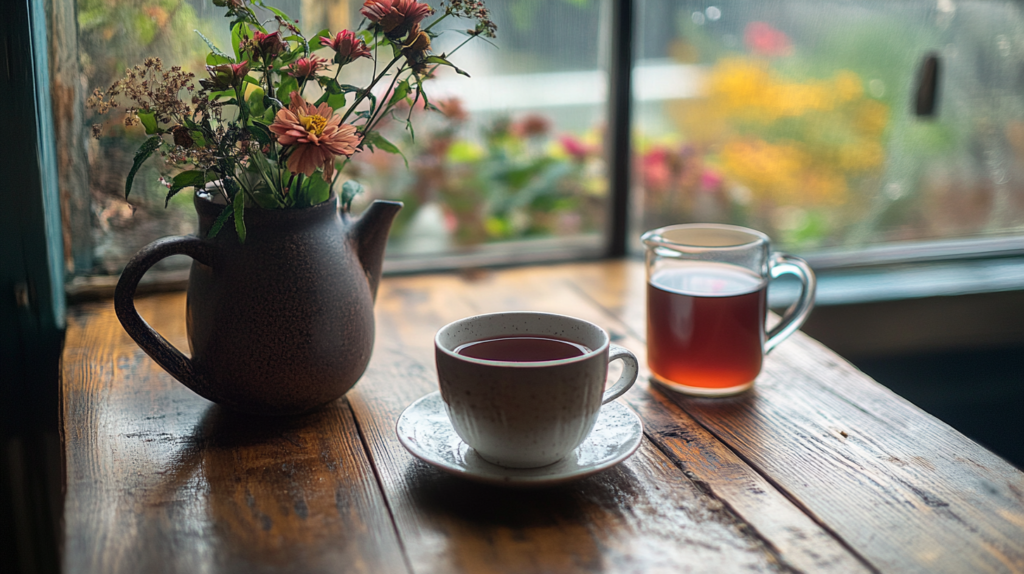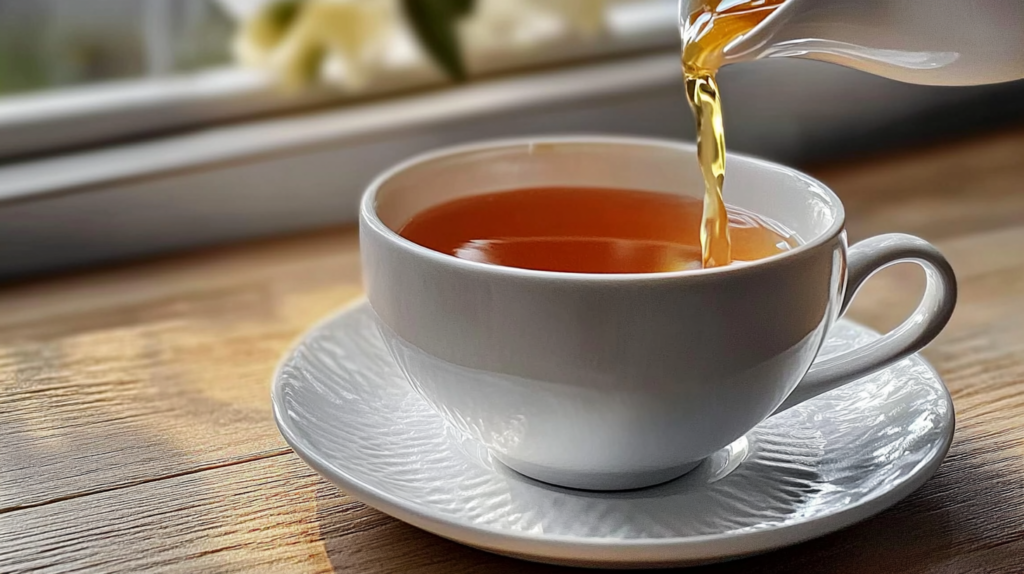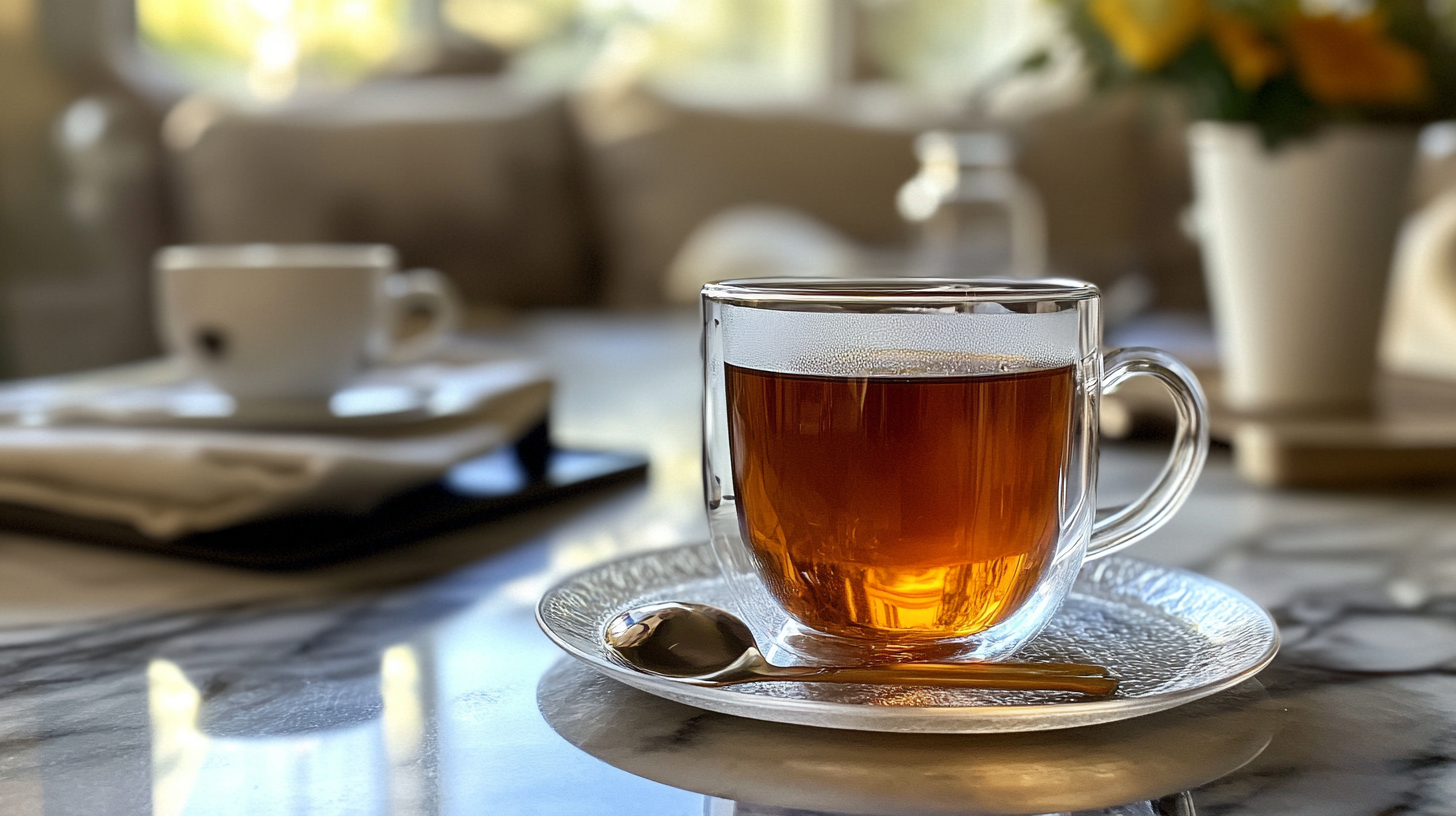Introduction
English Breakfast Tea is a beloved beverage that has gained immense popularity worldwide. Known for its robust flavor and deep, rich color, it is often the first cup of tea many people reach for in the morning. But what makes this tea so special? Is it simply the tradition, or does it have qualities that make it stand out among other teas? In this article, we will explore everything you need to know about it, from its origins and types to its health benefits and preparation methods.
Origins
A Historical Journey: How Did English Tea Come About?
It has a storied history that dates back to the 19th century. Contrary to what its name might suggest, no region of England specifically ties the blend. Tea producers create the blend using various black teas, primarily from Assam, Ceylon, and Kenya, which they combine to produce its signature bold flavor. In the mid-1800s, Queen Victoria’s reign helped popularize the name “English Breakfast Tea,” a time when tea-drinking culture flourished in England.
Marketers initially promoted the tea as a hearty, invigorating beverage perfect for morning consumption. It became a standard part of the English breakfast, which typically included eggs, bacon, toast, and other hearty fare. The robust flavor of English Breakfast Tea pairs well with these rich foods, making it a staple in households worldwide.
Who Invented it?
While the exact inventor of English Breakfast Tea is unclear, some legends attribute the creation of the blend to a Scottish tea merchant named Sir Thomas Lipton. Other sources suggest that a London tea merchant named Richard Twining created it. Regardless of its origin, the blend has become a quintessential part of English culture and people now enjoy it globally.
Types

Black Tea Blends: The Core Ingredients
English Breakfast Tea is a blend, which means it doesn’t come from a single tea plant or region. Instead, tea producers mix several types of black tea to create its distinctive strong flavor profile. Common tea varieties that make up this blend include:
- Assam Tea – Known for its malty, bold flavor, Assam tea gives the blend a rich body and full flavor.
- Ceylon Tea – From Sri Lanka, Ceylon tea is slightly more citrusy and bright, balancing the heaviness of Assam.
- Kenyan Tea – This variety is often included for its briskness and sharp, astringent notes.
- Chinese Tea – Some variations of English Breakfast may include tea from China, adding a slight smokiness to the mix.
Variations
While traditional English Breakfast Tea typically uses the aforementioned blends, different brands or regions may slightly alter the components. For example, some brands might blend in Kenyan tea for a sharper taste, while others might focus on the smoothness of Ceylon tea.
The Taste Profile
One of the reasons English Breakfast Tea is such a beloved beverage is its versatility when it comes to food pairings. The strong, full-bodied flavor of the tea complements a wide range of breakfast foods, making it a perfect morning companion. For example, it pairs beautifully with buttery croissants, rich scrambled eggs, and crispy bacon, as the tea’s astringency helps balance the oils in these dishes. Additionally, the robust taste can cut through the sweetness of jams, marmalades, and even pastries like scones. It also works wonders with heavier foods like sausages and black pudding, making it a perfect choice for a traditional British breakfast. Beyond the breakfast table, it can even enhance afternoon snacks like sandwiches or muffins. The combination of tea and food becomes more than just a meal – it’s an experience that highlights the flavors of both the food and the tea.
Bold and Brisk: What Makes it Special?
It’s famous for its bold, full-bodied flavor. The malty notes from Assam tea, combined with the bright, astringent quality from Ceylon, create a well-rounded cup of tea. People often describe it as brisk, with a flavor that holds up well to milk, sugar, or honey.
- Aromatic: The tea’s aroma is a blend of earthy, malty scents with a faint hint of floral notes.
- Taste: The primary taste of English Breakfast Tea is robust and strong, with a malty sweetness that gives way to a slight astringency. Depending on the blend, it may also have citrus or honeyed undertones.
- Finish: The finish of the tea is clean, with a mild lingering bitterness, typical of black teas.
Why is it Often Served with Milk?
One of the most well-known traditions surrounding English Breakfast Tea is the addition of milk. The reason for this is simple – the strong and robust flavor of the tea pairs well with the creaminess of milk, helping to balance out the astringency and bitterness. Additionally, the milk adds richness and smoothness to the tea, making it a perfect breakfast companion.
How to Brew the Perfect One

Step-by-Step
To enjoy a cup of English Breakfast Tea at its best, it’s essential to brew it properly. Here’s a simple guide to getting it just right:
- Choose Your Tea: You can use loose leaf tea or tea bags. Loose leaf tea often provides a richer taste.
- Water Temperature: Bring water to a near-boil, about 200–212°F (93–100°C).
- Steeping Time: Brew for 3-5 minutes. Shorter steeping times will yield a lighter flavor, while longer steeping times bring out a stronger, more robust taste.
- Add Milk (Optional): After steeping, pour the tea into your cup, and if you like, add milk to taste.
- Sweeten (Optional): Add sugar or honey if you prefer a sweeter cup.
Can You Brew English Breakfast Tea Cold?
Yes! It can also be brewed as an iced tea. Simply brew the tea as normal, allow it to cool, and serve over ice. It’s a refreshing alternative for warmer days.
The Health Benefits
Packed with Antioxidants: The Benefits of Drinking It
Drinking it offers several potential health benefits due to its high content of antioxidants, particularly polyphenols. Here are some of the key benefits:
- Rich in Antioxidants – Like many other black teas, it’s packed with antioxidants that can help neutralize free radicals in the body, reducing the risk of chronic diseases.
- Boosts Heart Health – The polyphenols in English Breakfast Tea may help lower cholesterol and improve heart health by reducing blood pressure.
- Improves Digestion – The tannins in black tea, such as English Breakfast Tea, can aid in digestion and reduce gastrointestinal discomfort.
- Improves Mental Alertness – Thanks to its caffeine content, it can improve focus and mental clarity.
Caffeine Content
One of the defining characteristics of English Breakfast Tea is its moderate caffeine content. On average, an 8-ounce cup contains about 40–70 mg of caffeine, depending on the brew strength. This is less than coffee but enough to provide a morning energy boost.
English Breakfast Tea in Different Cultures
English Breakfast Tea’s appeal goes beyond the United Kingdom. Over the years, it has become popular worldwide, with each country adding its unique twist. In the United States, it’s often enjoyed with traditional breakfasts or sweeteners. In Australia, it’s a go-to for early risers, paired with Vegemite toast. Even in Japan, where green tea is traditional, black teas like English Breakfast are gaining popularity among younger generations. Global chains like Starbucks and Dunkin’ have also contributed to its spread, offering it as part of their tea menus. Despite regional variations, the essence of English Breakfast Tea remains unchanged: a bold, invigorating brew that energizes and kick-starts the day.
How it Became Global
Although it’s originated in the United Kingdom, it has become a popular beverage around the world. In countries like the United States, Canada, Australia, and New Zealand, it’s a staple drink. Many British expats and tea lovers worldwide enjoy it as a comforting reminder of home.
In India, where tea culture is a significant part of daily life, it’s often served in hotels and cafes, though it’s typically enjoyed with added spices like cardamom and ginger.
Frequently Asked Questions (FAQs)
Can I drink English Breakfast Tea without milk?
Yes, it can be enjoyed without milk. While milk is traditionally added to balance the strong flavor, some prefer it black to fully experience its bold taste.
Is English Breakfast Tea good for weight loss?
It may aid in weight loss when consumed without sugar or milk. It contains antioxidants and compounds that may help boost metabolism and improve fat burning.
Does English Breakfast Tea have more caffeine than green tea?
Yes, it typically contains more caffeine than green tea. An average serving of English Breakfast Tea contains 40-70 mg of caffeine, while green tea usually has about 30-50 mg per serving.
How should I store English Breakfast Tea?
To preserve the flavor and freshness of your English Breakfast Tea, store it in an airtight container away from light, heat, and moisture.
Can English Breakfast Tea help with digestion?
Yes, it contains tannins that can promote healthy digestion. It can soothe an upset stomach and assist in the breakdown of food.
Can I sweeten English Breakfast Tea with sugar or honey?
Yes, you can sweeten your tea with either sugar or honey, depending on your preference. However, adding too much sugar may take away from the tea’s natural flavor.
What is in an English Breakfast Tea?
It’s a blend of several black teas, typically including Assam, Ceylon, and Kenyan teas. These varieties are known for their bold, full-bodied flavors and dark color when brewed. The tea is designed to be strong and robust, making it an ideal companion for hearty breakfasts, as the name suggests. The blend is also highly customizable in terms of brewing time and strength, allowing people to adjust it according to personal preference. Some variations may include small amounts of other black tea types, but the core essence remains the same: a hearty, invigorating brew.
What’s the Difference Between English Breakfast Tea and Normal Tea?
The term “normal tea” is quite broad, but if we are referring to regular black tea, the difference lies in the blend and flavor profile. While “normal tea” can refer to any black tea, it’s a specific blend of black teas, known for its stronger, more robust flavor. Regular black tea may come from a single region or type of tea leaf, while English Breakfast is a carefully balanced mix from different tea-growing regions, such as Assam, Ceylon, and Kenya. This gives English Breakfast its signature bold taste, often more assertive than what you might find in a typical black tea.
What is the Difference Between Earl Grey Tea and English Breakfast Tea?
Earl Grey and English Breakfast tea are both black teas, but they differ significantly in flavor and aroma. It’s typically a strong, full-bodied blend of black teas like Assam, Ceylon, and Kenya, with a malty, rich taste that pairs well with breakfast foods. Earl Grey, on the other hand, is flavored with oil of bergamot, which gives it a distinctive citrusy aroma and a more aromatic, slightly floral taste. While English Breakfast is often enjoyed plain or with milk and sugar, Earl Grey is typically served with lemon or enjoyed as a lighter, more aromatic tea. Essentially, the difference lies in the added bergamot oil in Earl Grey, giving it a more fragrant, citrusy twist compared to the hearty, malty flavor of English Breakfast.
Is Drinking English Breakfast Tea Good for You?
Yes, drinking English Breakfast Tea can offer several health benefits when consumed in moderation. Like most black teas, it contains antioxidants known as polyphenols, which can help reduce inflammation and protect the body against oxidative stress. The caffeine content in it provides a natural energy boost, making it a popular choice in the morning to kick-start your day. It can also support digestion and improve heart health by potentially reducing cholesterol levels. Furthermore, this tea is low in calories and, when consumed without added sugar or milk, can be a healthy addition to your daily routine. However, as with any caffeinated beverage, it’s important to consume it in moderation to avoid excess caffeine intake.
Conclusion
English Breakfast Tea is more than just a morning drink. It’s a global icon that carries with it centuries of history, tradition, and cultural significance. Whether you prefer it with milk, a slice of lemon, or just black, it offers a versatile and comforting experience. The perfect blend of boldness, richness, and health benefits makes it a favorite among tea lovers worldwide. Whether you’re sipping it at breakfast or enjoying a quiet afternoon break, a cup of this tea is sure to offer warmth and satisfaction.

